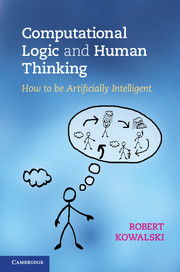Book contents
- Frontmatter
- Contents
- Preface
- Summary and plan of the book
- Introduction
- 1 Logic on the Underground
- 2 The psychology of logic
- 3 The fox and the crow
- 4 Search
- 5 Negation as failure
- 6 How to become a British Citizen
- 7 The louse and the Mars explorer
- 8 Maintenance goals as the driving force of life
- 9 The meaning of life
- 10 Abduction
- 11 The Prisoner’s Dilemma
- 12 Motivations matter
- 13 The changing world
- 14 Logic and objects
- 15 Biconditionals
- 16 Computational Logic and the selection task
- 17 Meta-logic
- Conclusions of the book
- A1 The syntax of logical form
- A2 Truth
- A3 Forward and backward reasoning
- A4 Minimal models and negation
- A5 The resolution rule
- A6 The logic of abductive logic programming
- References
- Index
14 - Logic and objects
Published online by Cambridge University Press: 07 September 2011
- Frontmatter
- Contents
- Preface
- Summary and plan of the book
- Introduction
- 1 Logic on the Underground
- 2 The psychology of logic
- 3 The fox and the crow
- 4 Search
- 5 Negation as failure
- 6 How to become a British Citizen
- 7 The louse and the Mars explorer
- 8 Maintenance goals as the driving force of life
- 9 The meaning of life
- 10 Abduction
- 11 The Prisoner’s Dilemma
- 12 Motivations matter
- 13 The changing world
- 14 Logic and objects
- 15 Biconditionals
- 16 Computational Logic and the selection task
- 17 Meta-logic
- Conclusions of the book
- A1 The syntax of logical form
- A2 Truth
- A3 Forward and backward reasoning
- A4 Minimal models and negation
- A5 The resolution rule
- A6 The logic of abductive logic programming
- References
- Index
Summary
What is the difference between the fox and the crow, on the one hand, and the cheese, on the other? Of course, the fox and the crow are animate, and the cheese is inanimate. Animate things include agents, which observe changes in the world and perform their own changes on the world. Inanimate things are entirely passive.
But if you were an Extreme Behaviourist, you might think differently. You might think that the fox, the crow and the cheese are all simply objects, distinguishable from one another only by their different input–output behaviours:
if the fox sees the crow and the crow has food in its mouth,
then the fox praises the crow.
if the fox praises the crow,
then the crow sings.
if the crow has food in its beak and the crow sings,
then the food falls to the ground.
if the food is next to the fox,
then the fox picks up the food.
Extreme Behaviourism was all the rage in Psychology in the mid-twentieth century. A more moderate form of behaviourism has been the rage in Computing for approximately the past 30 years, in the form of Object-Orientation.
Information
- Type
- Chapter
- Information
- Computational Logic and Human ThinkingHow to Be Artificially Intelligent, pp. 179 - 187Publisher: Cambridge University PressPrint publication year: 2011
